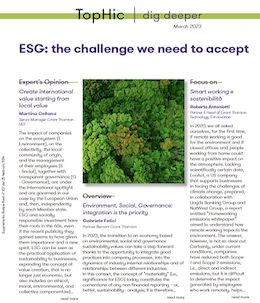-
Transactional advisory services
Find out more about the transactional advisory services of Grant Thornton Financial Advisory Services
-
Valuations
Find out more about the valuations services of Grant Thornton Financial Advisory Services
-
Mergers and acquisitions
Find out more about the merger and acquisition services of Grant Thornton Financial Advisory Services
-
Forensic and investigation services
Find out more about the forensic and investigation services of Grant Thornton Financial Advisory Services
-
Recovery & reorganisation
Find out more about the Recovery & reorganisation services of Grant Thornton Financial Advisory Services
-
Business risk services
Find out more about the business risk services of Grant Thornton Financial Advisory Services
-
Business consulting
Find out more about the business consulting services of Grant Thornton Financial Advisory Services
-
Capital market
Capital market
-
Corporate and business tax
Find out more about our corporate and business tax services.
-
Direct international tax
Find out more about our direct international tax services.
-
Global mobility services
Find out more about our global mobility services.
-
Indirect international tax
Find out more about our indirect international tax services.
-
Transfer pricing
Find out more about our transfer pricing services.
-
Litigation
Our lawyers and accountants can manage all defense measures provided not only by the Italian law, but also by EU regulations and conventions
-
Family business
Find out more about our Family business services.
-
Legal
The client can be assisted in every need and with the same care both on important operations or disputes and on simple matters

-
Back office outsourcing
Find out more about our Back office outsourcing services
-
Business process outsourcing
Find out more about our business process outsourcing services.
-
Compilation of financial statements
Find out more about our compilation of financial statements services.
-
Tax compliance
Find out more about our tax compliance services.
-
Electronic invoicing
Find out more about our electronic invoicing services
-
Electronic storage
Electronic storage is an archiving procedure that guarantees the legal validity of a digitally stored electronic document
-
Revaluation of corporate assets
Find out your civil and fiscal revaluation of tangible, intangible and financial assets
-
Payroll
Complete and customized payroll service, integrated with digital solutions and compliant with Italian and international regulations.
-
Labor consultancy
We help Italian and international companies manage all aspects of their workforce.
-
HR & Payroll Advisory Services
We review contracts, payroll, and risks for extraordinary transactions and we assess tax, labor, and safety risks in outsourcing contracts.
-
Extended services
We provide integrated digital tools to simplify HR management.
-
HR Infinity Portal
The HR Infinity Portal is Zucchetti’s platform designed to centralize communication between the company and its employees.
-
Cybersecurity
GT Digital helps clients structure information security management internal functions, also through partially or totally outsourced functions
-
Agile and Programme Management
GT Digital provides support in the adoption and implementation of different portfolio management
-
Robotic Process Automation
Our “BOT Farm” can rely on digital workers able to help clients in routine activities, allowing employees to deal with more added-value activities
-
Data strategy and management
GT Digital can support clients in seizing the opportunities offered by Big Data, from the definition of strategies to the implementation of systems
-
Enterprise Resource Planning
We support clients in selecting the most appropriate ERP System according to their specific needs, helping them also understand licensing models
-
IT strategy
GT Digital supports clients in making strategic choices, identifying innovation opportunities, comparing themselves with competitors
-
IT service management
We can support with software selection and with the implementation of dedicated tools for the management of ICT processes
-
DORA and NIS 2
The entry into force of the DORA Regulation and NIS2 represents a major step towards the creation of a harmonised regulatory framework
The impact of companies on the ecosystem (E - Environment), on the collectivity, the local community of origin, and the management of their employees (S - Social), together with transparent governance (G - Governance), are under the international spotlight and are governed in our case by the European Union and, then, independently by each Member state.
ESG and socially responsible investment have their roots in the 60s, even if the recent publicity they gained seems to have given them importance and a new spirit. ESG can be seen as the practical application of sustainability to businesses, expanding the concept of value creation, that is no longer just economic, but also includes an ethical, moral, environmental, and collective component.
In recent years, the environmental crises and the growing political will to act in this regard have led ESG issues and related reporting means to become a critical aspect in a company's operations.
Besides playing a role in decisions relating to mergers, acquisitions, investments, and divestments, according to some research, ESG issues show a positive correlation with financial performance and the creation of corporate value. ESG issues started a transition towards a more inclusive and proactive capitalism.
Within the broad European regulation, the EU Taxonomy regulation (EU Regulation 2020/82) aims to overcome the lack of shared definitions and to favour information transparency and comparability by introducing a classification of sustainable economic activities.
Hence the operational challenge of identifying those economic activities that can be defined as environmentally friendly and respect the three criteria defined by the European Regulation. In order to be defined as sustainable, an economic activity must:
- contribute to acting in a substantial way on at least one of the six environmental objectives set by the Taxonomy regulation
- not cause significant damage to any of the other targets
- meet certain social protection minimum guarantees
The complexity of the topic, in addition to the relevant application difficulties, require specialized figures, capable of assisting companies and institutions in the process of change towards a higher sustainability and the related non-financial information reporting.
Within the scope of action governed by the European regulation, which is constantly evolving, each European country must adopt an adequate strategy. Indeed, environmental progress varies from one country to another and each Member state has autonomy in determining the regulation to be implemented in order to achieve the ambitious EU objectives. The differences in application and the different "progress" between the countries lead to further complications, especially for multinational companies.
In order to mitigate the vagueness of ESG and the differences between Member states, the European Union is defining a new legal framework for a sustainable economy, including the definition of shared reporting standards. While the commitment of the European Union in this regard is evident, regulations are not so strict in other parts of the world. In the United States, for example, responses to ESG issues have been mostly voluntary and market-driven, rather than being turned into new regulations.
During my recent secondment experience in the corporate finance team at Grant Thornton Ireland in Dublin, I could see how the growing demand for assistance, advice and information on ESG issues by companies, as well as the increasingly crucial role that these play in investment choices, have often resulted in the recruitment of a dedicated person with a consolidated background in sustainable finance and green bonds. In my everyday experience, however, I could see a more evolved concept of the Social dimension compared to the Italian situation.
After focusing on environmental aspects, the European Union is also working on a social taxonomy. When living in Nordic countries, it is easier to understand why the Social aspect of ESG may seem secondary in the European regulation, compared to the Environmental issue (E).
Although, in general, there is still a long way to go, I could see how issues such as diversity, corporate welfare, employee support, doing business that is sustainable for a company’s employees and community are an integral part of the companies and established customs in Northern Europe countries.
Given the attention paid by national and international organizations to ESG issues and the increasing awareness by investors and companies that ESG criteria could become mandatory for a wider range of players, it will not be surprising if these issues and the related effects on corporate operations and information remain in the spotlight for a long time to come.
Hence, a new question arises – how can we understand the difference between "greenwashing" and "real sustainability"?

